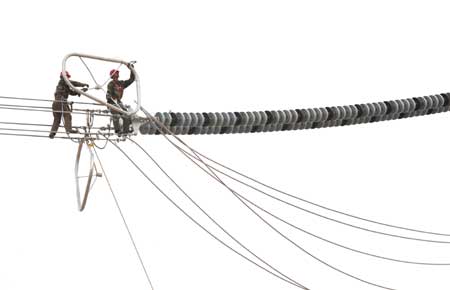Energy
Power generators report increased demand; coal costs dent profits
By Liu Yiyu (China Daily)
Updated: 2010-07-20 09:32
 |
Large Medium Small |
|
 |
|
Workers set up power transmission cables in Gansu province. [Zhang Tieliang /?China Daily] |
Most listed power companies have outperformed the benchmark Shanghai Composite Index as the recent heat wave pushed up electricity demand - and fueling market sentiment that soaring demand would beef up producers' bottom line.
China Electricity Council (CEC) said on Wednesday that the nationwide electricity producers generated 1.78 trillion kWh during the first six months of this year, up 22 percent year on year.
Amongst those companies, China Guodian Corp's energy output increased 15 percent, Huadian Power's was up almost 25 percent and SDIC Huajing Power rose nearly 31 percent.
Increases in power generation have already translated into profit growth. According to the National Bureau of Statistics, the nation's thermal power plants, which often reported losses over the last few years, have generated combined profits of 16.9 billion yuan over the first five months of this year, representing 48 percent year-on-year growth.
The growth momentum, however, may not be sustained as higher costs and low electricity prices are expected to dent profitability, said analysts.
"Although earnings have turned positive, thermal power plants are still weak in profitability due to unstable coal prices," said Xue Jing, head of CEC's Statistics Department.
Coal prices hikes have stabilized in the second quarter compared to the first three months this year. The spot price for coal at Qinhuangdao, China's biggest port for the fuel, was 755 yuan a ton as of July 12, compared with 805 yuan six month ago, according to Wind Info.
"The current prices are still high and may continue to go upward," said Lin Boqiang, director of the Center for Energy Economic Research of China at Xiamen University.
According to Lin, power companies may suffer higher losses on a yearly basis.
The return on sales of China's leading power generators - Huaneng, Datang, State Power, Huadian and China Power Investment Group, all State-owned enterprises (SOEs) - was only 1.2 percent compared to the average of 6.3 percent among China's SOEs in 2009. Moreover, their debt-asset ratio, on average, is 80 percent due to large bank loans taken out for coal purchases.
To help control electricity producers' costs, the National Development and Reform Commission (NDRC), the nation's economic regulator, has tried to cap contract coal prices at the end of June at around 570 yuan a ton, 200 yuan below market prices.
"The ultimate solution to the problem is to liberalize electricity prices," said Lin Boqiang.
Domestic electricity companies are at the will of coal prices, with coal accounting for 70 percent of their production costs.
To minimize impact of rising coal costs, there have been repeated calls to hike electricity prices. But analysts are split on whether the NDRC should increase electricity prices. Some believe Beijing is unlikely to let electricity prices go up with inflation pressure still posing a big threat. Others are convinced of an electricity price rise later this year, as they believe coal prices will continue to increase, placing more pressure on power producers.
With no solution in sight, electricity producers have no choice but to increase coal holdings before prices rise further.
?



